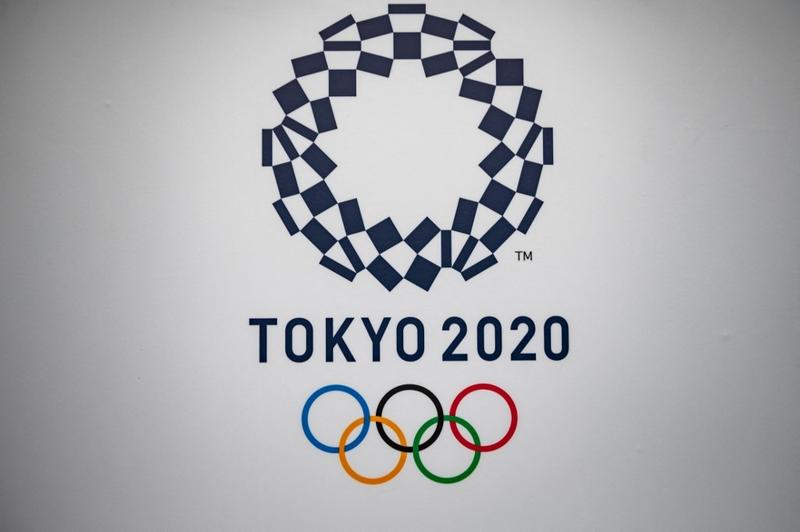 The Tokyo 2020 logo is seen at the Tokyo International Exhibition Centre, also known as Tokyo Big Sight, where the International Broadcast Centre and Main Press Centre for the Tokyo 2020 Olympic and Paralympic Games are located, in Tokyo on June 28, 2021. (PHILIP FONG / AFP)
The Tokyo 2020 logo is seen at the Tokyo International Exhibition Centre, also known as Tokyo Big Sight, where the International Broadcast Centre and Main Press Centre for the Tokyo 2020 Olympic and Paralympic Games are located, in Tokyo on June 28, 2021. (PHILIP FONG / AFP)
TOKYO - Japan is looking at barring all but VIP spectators at the opening ceremony of the Tokyo 2020 Olympics, a newspaper said on Tuesday, another downgrade for Games that have their pomp and public spectacle overshadowed by the coronavirus pandemic.
The Games, already delayed a year, are set to open on July 23 despite concern that an influx of tens of thousands of people from around the world could unleash another wave of infections
Once promoted as an extravaganza to showcase Japan to the world, the Games appear in danger of taking place largely out of public view in a country closed to foreign tourists due to the pandemic.
The Games, already delayed a year, are set to open on July 23 despite concern that an influx of tens of thousands of people from around the world could unleash another wave of infections.
Japan's government is arranging for the opening ceremony to be held with only a reduced number of VIP spectators, the Asahi newspaper reported, ahead of talks with the International Olympic Committee and other organisers.
ALSO READ: Organizers cap Tokyo 2020 spectators at 10,000 per venue
Events at large venues and night events after 9 pm would also be held without spectators, while the number of VIPs such as sponsors' guests and diplomats at the opening ceremony would be reduced sharply from an initial estimate of about 10,000, the paper said, citing multiple unidentified government sources.
Organisers have already banned spectators from overseas and set a cap on domestic spectators at 50% of capacity, up to 10,000 people. Medical experts have saidhosting the Games with no spectators would be the “least risky” option.
Japan's government looks likely to decide on Thursday to extend a state of quasi-emergency in Tokyo and three nearby prefectures beyond an original end-date of July 11, government sources have said, a move which would require a rethink on spectators as well.
That matter will be decided at five-way talks also expected on Thursday that will include the Tokyo governor and IOC President Thomas Bach, who arrives in Japan the same day.
Torch relay
When the Games were postponed last year, Japanese officials said they hoped they would be held as a symbol of "victory" by humankind over the virus. With that goal elusive, they now say the event will help bring together a divided world.
In another blow, the Olympic torch relay, set to reach Tokyo on July 9 and parade through the centre of the city from July 17 until the opening ceremony, will be moved off public roads for the entire period and instead torch-lighting ceremonies will be held without spectators, the Yomiuri newspaper reported.
Plans for the opening ceremony remain under wraps. One start-up backed by Toyota Motor Corp said in 2017 it aimed to light the Olympic flame with its flying car.
In 2015, then-prime minister Shinzo Abe promised visitors would be able to use self-driving cars to run around Tokyo. The event, he said, would be "buy one get two" event, showcasing both the Games and self-driving technology.
Asked about spectators, top government spokesman Katsunobu Kato noted at a news conference that Prime Minister Yoshihide Suga has said holding the Games without spectators was a "possibility" if a state of emergency was in effect.
READ MORE: Tokyo 2020 promise to be weirdest ever for isolated athletes
Suga was keen to have fans in the stadiums, the Asahi said, but added some ruling party members favour a complete ban, especially after the ruling coalition failed to win a majority in Sunday's election for the Tokyo local assembly, partly due to voters' dissatisfaction with the government's COVID-19 response.
That poll is seen as a bellwether for a general election later this year.
Japan has not had the explosive COVID-19 outbreaks seen elsewhere but has recorded over 800,000 cases and more than 14,800 deaths. Only a quarter of its population has had at least one vaccination shot after an initially slow rollout.


